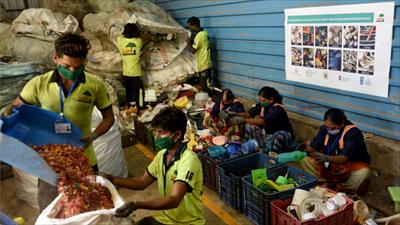
In response to the urgent need for plastic waste management, Hindustan Unilever Limited (HUL) in partnership with United Nations Development Programme (UNDP) positively impacted more than 33,000 households across three wards of Mumbai – K-East (Andheri East), H-West (Bandra West) and R-North (Dahisar) – through a plastic waste material-recovery model. The project will be scaled to include more households in the coming years.
The technology-powered model will enhance segregation, collection, and recycling of all kinds of plastic waste along the value chain, creating resource efficiency and supporting a circular economy. This has been done with the support of the Brihanmumbai Municipal Corporation (BMC) and Consumer Citizen groups such as the Swachh Parle Abhiyan who played an important role in driving awareness around collection and segregation of plastic waste at source.
The programme has helped collect and segregate dry waste with nearly 2500 tonnes of plastic waste being collected so far. Over 500 Safai Sathis (waste collectors) have been on-boarded as part of this initiative.
To demonstrate the success of the model, HUL hosted a virtual roundtable on driving end-to-end plastic waste management in Mumbai, in partnership with UNDP and the Municipal Corporation of Greater Mumbai (MCGM). The roundtable showcased HUL-UNDP’s partnership to establish the model where, along with collection and recovery of dry waste, there was a focus on driving behaviour change to promote waste segregation at source. Through this project, HUL and UNDP are also ensuring the wellbeing and financial inclusion of Safai Sathis. The project is aligned with the Government of India’s Swachh Bharat (Clean India) Mission, Solid Waste Management Rules 2016, and Plastic Waste Management (Amendment) Rules 2018.






